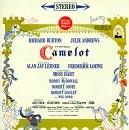Camelot lyrics
Camelot
ARTHUR:
It's true! It's true! The crown has made it clear.
The climate must be perfect all the year.
A law was made a distant moon ago here:
July and August cannot be too hot.
And there's a legal limit to the snow here
In Camelot.
The winter is forbidden till December
And exits March the second on the dot.
By order, summer lingers through September
In Camelot.
Camelot! Camelot!
I know it sounds a bit bizarre,
But in Camelot, Camelot
That's how conditions are.
The rain may never fall till after sundown.
By eight, the morning fog must disappear.
In short, there's simply not
A more congenial spot
For happily-ever-aftering than here
In Camelot.
Camelot! Camelot!
I know it gives a person pause,
But in Camelot, Camelot
Those are the legal laws.
The snow may never slush upon the hillside.
By nine p.m. the moonlight must appear.
In short, there's simply not
A more congenial spot
For happily-ever-aftering than here
In Camelot.
Last Update: December, 02nd 2013
